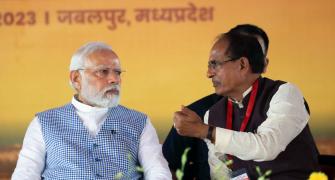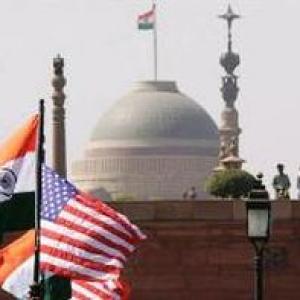 No theory would ever justify the public humiliation of the acting head of the consulate of a friendly country. Whatever be the eventual solution, grievous damage has been done to her personally and to the relations between the two countries, says Ambassador T P Sreenivasan.
No theory would ever justify the public humiliation of the acting head of the consulate of a friendly country. Whatever be the eventual solution, grievous damage has been done to her personally and to the relations between the two countries, says Ambassador T P Sreenivasan.
The arrest and handcuffing of India's Deputy Consul in New York, Dr Devyani Khobragade, left, was, undoubtedly, a national humiliation for which the US should be held responsible.
It is immaterial whether she was guilty of violating laws, whether she was entitled to diplomatic immunity or whether India-US relations are at a low ebb. As long as she was not guilty of a criminal act and not a threat to law and order, there was no justification for the high-handed behavior of the US Attorney for the Southern District of New York.
There was nothing in the alleged crime which necessitated her detention for a whole day in a cell like an ordinary criminal.
The case, as it has emerged from press reports, is related to a technical irregularity, nothing more.
Indian diplomats are allowed to take one or more India Based Domestic Assistants, IDBA, at government expense precisely because domestic help is essential to perform their representational duties and because hiring such services in Western countries is prohibitively expensive.
Some years ago, the US government began insisting that IDBAs should have contracts, indicating their wages, which should not be below the minimum wages in the country, and hours of work, etc for facilitating the issue of the necessary A3 visas.
Everyone understood that no Indian diplomat, or for that matter, any other diplomat would be able to pay nearly $10 per hour. The diplomats themselves are not paid that much!
Therefore, contracts were produced for visa purposes and they were given accommodation, food, clothes, medicine etc and wages, which are reasonable by Indian standards.
In most cases, this did not pose a problem. Those who stayed with the diplomats for three years managed to stay back as immigrants and prospered.
Some others, lured by Indian employers, restaurants and others in the early days of their stay, simply deserted the diplomats and made a living.
A very few took recourse to the law either to hurt the diplomats, who may not have treated them well or to seek asylum under the US laws on human rights, human trafficking etc.
Sangeeta Richard, the deputy consul general's IBDA, appears to be in the last category even though we do not know how the tussle was triggered. Hopefully, she was treated well by her employers in the initial days of her employment.
She disowned her Indian contract and sought to enforce the US contract in the hope of getting a huge compensation, as it happened in the case of another diplomat in the same consulate.
The case was compounded by the fact that Dr Khobragade or her parents had already taken Richard to court in India.
The US authorities, which are aware of the existence of such a technical irregularity in several cases, should have normally alerted the consulate and sought a solution. Even in more serious cases, the two countries have withdrawn their diplomats by mutual agreement to avoid the operation of the law.
Against this background, the drastic action by the law enforcement authorities is beyond comprehension. One simple, but absurd explanation is that two other cases had come up in the consulate and they decided that enough was enough and decided to come down on Dr Khobragade like a ton of bricks.
The most unlikely theory is that something went terribly wrong in India-US relations recently and the US decided to teach India a lesson. But none of these would ever justify the public humiliation of the acting head of the consulate of a friendly country.
Whatever be the eventual solution, grievous damage has been done to her personally and to the relations between the two countries.
Prescriptions for immediate and long-term remedies are legion in the media, the Twitter world and the blogs. The angriest responses include suggestions for immediate reciprocal actions against US consular officers in India.
Reciprocity is an accepted practice in diplomacy and even friendliest of nations indulge in it to contain the sense of public outrage in the aggrieved country. Expulsions of innocent diplomats for inappropriate behaviour are not uncommon in the world of diplomacy.
Another diplomatic action suggested is to recall some of our consular officials, thus reducing the services available to American citizens. We may end up hurting our own interests in the process, but the impact will be felt.
Withdrawing some of the privileges enjoyed by the American consular corps in India is another measure to be contemplated. The label of an American diplomat is the ultimate access pass in airports and other facilities today.
Other than these, we can only use stronger and stronger words of protest as the case against Dr Khobragade progresses in New York. No one in India will be in favour of hurting India-US relations on account of the incident in New York.
For the long term, we need to streamline the service conditions of IBDAs in countries that insist on payment of local minimum wages to them.
One way is to persuade the local authorities to add up the perks given to the IBDAs like accommodation, food, medical facilities and leave travel in determining their wage structure.
A former diplomat has made a calculation that these amount to an average of $1,958 per month, amounting to $12.2 per hour. They already have official passports, but the host countries do not recognise these, as they are not registered as employees of the mission, who have A2 visas.
It should be within our prerogative to turn them into officials of the mission, even if they work in homes.
A third way is to discontinue the system of IBDAs and allow our officials to hire local help, which will be prohibitively expensive.
Mistreatment of IBDAs is not uncommon because of our sense of hierarchy and caste system. This must end, whatever be the eventual system of domestic help we may design for our missions.
A matter to be noted is that there is a presumption of guilt of the diplomats among the general public in India. Old images of diplomats as indulging in pleasures of life with sartorial elegance still linger even in these days of increasing risks, which include 'nanny terror.'
Many comments following the Khobragade incident reflect prejudices mixed with envy. This is a phenomenon diplomats have to live with.
Dr Khobragade's parents did not mean it when they named her Devyani, but the mythological Devyani had more than her share of trouble from Sharmishta, a princess, who ended up as her domestic help.
It is time that she and other diplomats are rid of the risk of facing ignominy caused by unscrupulous India Based Domestic Assistants.
T P Sreenivasan (Indian Foreign Service, 1967) is a former ambassador of India to the United Nations, Vienna, and a former Governor for India at the International Atomic Energy Agency, Vienna.
He is currently the Director General, Kerala International Centre, Thiruvananthapuram, and a Member of the National Security Advisory Board.
For more articles by Ambassador Sreenivasan, kindly click here










